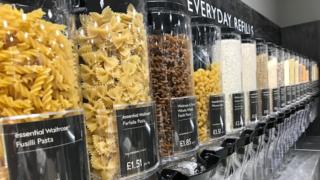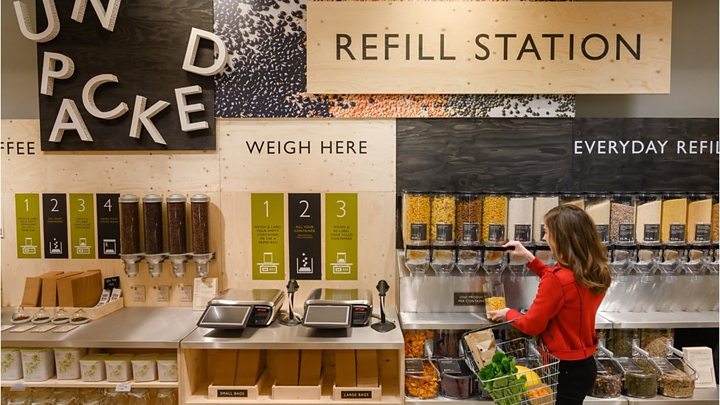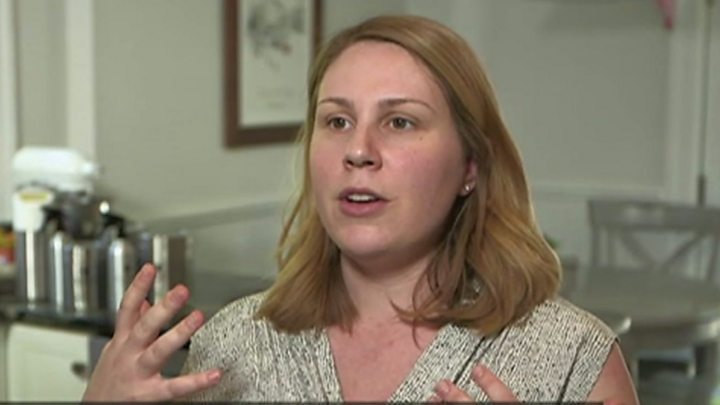
Bunches of bananas wrapped in plastic. A pre-peeled orange in a plastic box. Shrink-wrapped cucumbers.
Over-packaged food has been bothering shoppers for years and supermarkets have responded by looking for alternatives to all that plastic.
But now MPs are saying that the UK needs to move away from all single-use packaging - not just plastic.
Using aluminium, glass, paper or compostable plastics as an alternative also has an environmental impact, potentially pushing up energy use and carbon emissions, says a report by the Environment, Food and Rural Affairs Committee.
It says reuse and refill schemes could be part of the solution and wants the government to consider whether official intervention could encourage more shops to offer refillable options.
Here we look at how five leading supermarkets are tackling the packaging problem.
Waitrose
Target: To eliminate single-use plastic
Current usage: 31,000 tonnes of plastic in 2018

Waitrose is ahead of the pack when it comes to reuse and refill schemes.
Since June, customers at its Botley Road store in Oxford have been filling their own containers with pasta from large jars, beer on tap and pick 'n' mix frozen fruit, doing away with packaging altogether.
And it's proved such a hit (more than 90% of its customers want it to continue) that it's rolling out the scheme in Cheltenham, Abingdon and Wallingford by the end of the year.
Other measures include:
- Removing all black plastic from own label ranges. (Waitrose has already removed black plastic on fresh meat, poultry, fish and fruit and veg)
- Introducing coloured packaging made from recycled plastic for ready meals
- Allowing customers to bring their own containers to the meat, fish or cheese counter
- Replacing all single use fruit and veg bags with a home compostable alternative (banana bags are covered in the words "home compostable bag" and a suggestion to use it as a food waste caddy liner)
- Removing single use coffee cups saving 52 million cups a year
- Ensuring all own-label cards, wraps, crackers, tags, flowers and plants are glitter-free by Christmas 2020
Tesco
Target: To remove hard-to-recycle materials, including PVC and polystyrene
Current usage: 252,500 tonnes of plastic packaging in 2017
The biggest of the "big four" says it's on target to to eliminate the hardest to recycle materials from its own brand products by the end of the year, but it will take longer to get its suppliers to do the same.
In the meantime, it's turning its attention to excessive packaging, pointing to the half-filled crisp packets and the airy cereal boxes on the shelves.
From next year, it will assess the size and suitability of packaging of every product it stocks - and will weed out any that don't make the grade.

In early 2020, Tesco will trial a new online delivery scheme called Loop, essentially a modern take on the milkman.
Tesco will deliver products ordered online to homes in reusable containers that will then be collected, cleaned and refilled.
The idea behind it is to eliminate unnecessary waste before it happens.
Other measures include:
- Turning Tesco Extra in Cambridge into a trial store to look at new ways to reduce waste. For example selling multi-buys for the same price as multipacks, usually bound up in plastic, and an aisle selling only loose fruit and veg. If these moves work, they could be rolled out across the UK. Other options would then include scrapping multipack tins, getting rid of binders on beer cans and removing cutlery from the store's "on the go" range
- Exploring new technologies to make recyclable film lids and pouches
- Scrapping plastic bags with home delivery orders
Sainsbury's
Target: To halve plastic packaging by 2025
Current usage: Almost 120,000 tonnes of plastic packaging in a year
Last year the UK's second biggest supermarket reduced plastic packaging by just 1% and came bottom in Greenpeace's survey.
But it looks as though the supermarket is now swinging into action, setting itself what it calls an ambitious target.
Some new measures include:
- Removing lightweight loose produce bags from this month
- Getting rid of plastic trays from asparagus, sweetcorn, tomatoes, carrots and herb pots
- Encouraging customers to bring their own containers to meat and deli counters
- Replacing plastic film on fruit and vegetables with a recyclable alternative by the end of next year
- Switching PVC and polystyrene trays for a recyclable alternative. Options are currently being reviewed
- Doing the same for fresh food black plastic trays by the end of this year. These will be replaced with products made from a natural CPET material, a form of recyclable plastic
- Trialling a "pre-cycle" area in stores where shoppers can remove unwanted packaging and leave it for recycling
- Piloting deposit return schemes so shoppers can return recyclable packaging easily
Sainsbury's acknowledges it can't reach its target on its own, saying shoppers will have to change their behaviour.
For example, the supermarket is looking at options to replace milk bottles, one of the shop's largest sources of plastic packaging. This could mean refillable bottles, returnable milk bottles or offering a reusable jug with milk in a plastic pouch.
While the supermarket works closely with other retailers, manufacturers, packaging suppliers, scientists and recycling experts to find solutions, it is asking its customers to pitch in their ideas too.
Asda
Target: To use the least amount of any material possible
Current usage: 65,500 tonnes of plastic packaging a year
Asda says it's trying to use less and recycle more, in that order. Since February 2018, it says its removed 6,500 tonnes of plastic - the equivalent of 600 million empty plastic bottles - from own brand products.
Other measures include:
- Trialling a new type of coating on fresh produce, which could double the shelf life. The "extra peel", made from materials that exist in seeds and fruit and veg pulp, was used on a shipment of clementines to Chatham in Kent and Glasshoughton in West Yorkshire. The coating, approved for use by the EU Commission in June, protects the fruit from spoilage for longer and could reduce the amount of packaging required to prolong shelf life
- Removing plastic wrapping from more than 50 million greetings cards, unwrapping 6 million swedes and removing unnecessary films, trays and windows
- Encouraging shoppers to bring their own reusable fruit and veg bags
- Saving 375 million single-use carrier bags by no longer offering them in store or for online shopping
- Selling refillable cleaning products (Asda first trialled refillable fabric conditioner machines in 2010)
Aldi
Target: 100% recyclable, reusable or compostable packaging across all products by 2025
Current usage: Not provided
The German discount supermarket has 13 pledges on plastics and packaging. They've been stripping the plastic from their tomatoes, broccoli, potatoes and aubergines, and have a number of other measures in the pipeline, including:
- Trialling paper and compostable carrier bags after scrapping 5p single-use carrier bags. The most popular will be rolled out in all stores
- Removing difficult-to-recycle packaging including expanded polystyrene, PVC and non-detectable black plastic from the shop's food range by the end of 2020
- Removing non-biodegradable glitter from Halloween and Christmas ranges by the end of 2020
- Losing the plastic packaging on cabbages and cauliflower in stores in Scotland and parts of England
- Scrapping plastic packaging on multipacks of tinned tuna
- Using cardboard rather than polystyrene pizza bases
- Trialling wrapping toilet rolls in paper, rather than plastic
- Trialling cardboard packaging on steak
Morrisons
Target: To reduce plastic packaging by a quarter and have 100% recyclable, reusable or compostable packaging by 2025
Current usage: Around 100,000 tonnes of plastic packaging in a year
The UK's fourth-biggest grocer, which came second in Greenpeace's survey, has led the way in letting customers make use of reusable containers.
Since 2018, customers have been able to fill their own containers with items from the meat and fish counters - it says it has removed 1.8m meat and fish trays from its stores.
It also trialled a reuse and refill scheme for produce such as pasta, seeds and frozen fruit.
Morrisons' focus has also been on providing unpackaged produce. It says it has the highest proportion of loose fruit and vegetable sales of any supermarket and it is introducing a special area for these products in 60 of its stores this year.
The supermarket says it is working through all of its own brand products to identify, reduce and remove any unnecessary plastic packaging.
Other measures include: